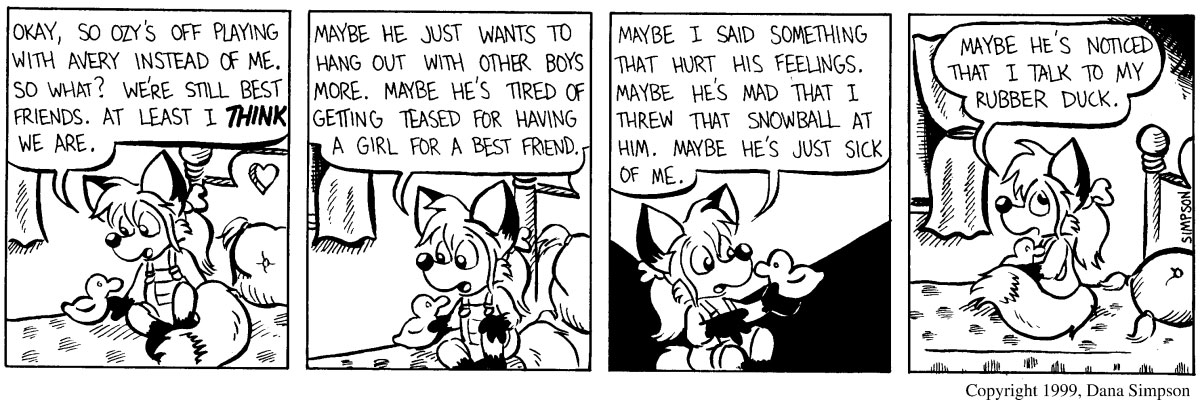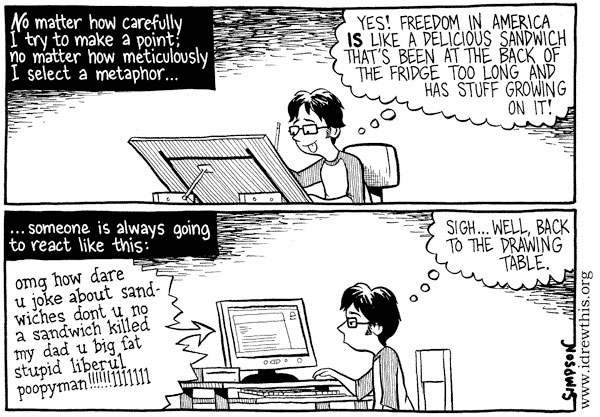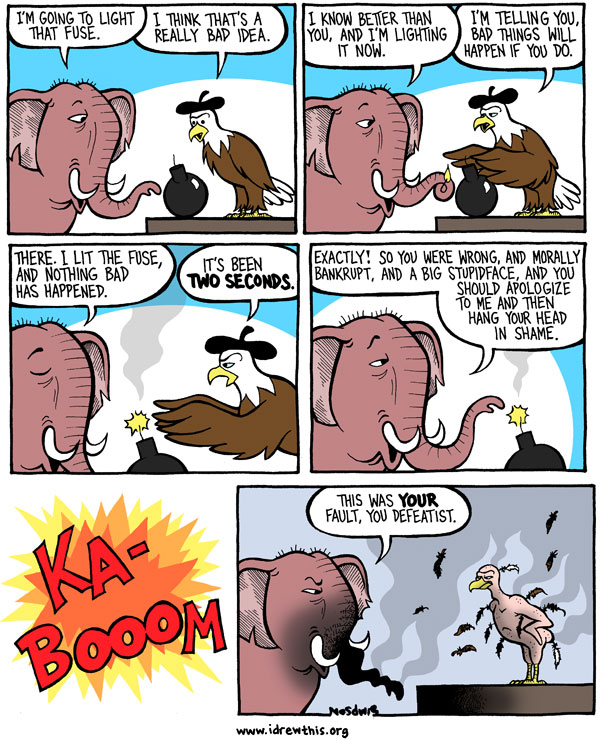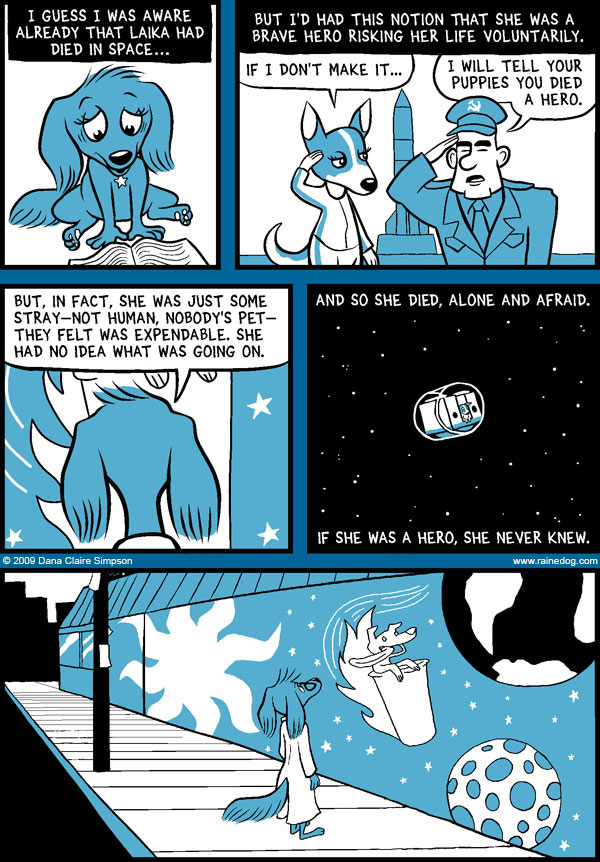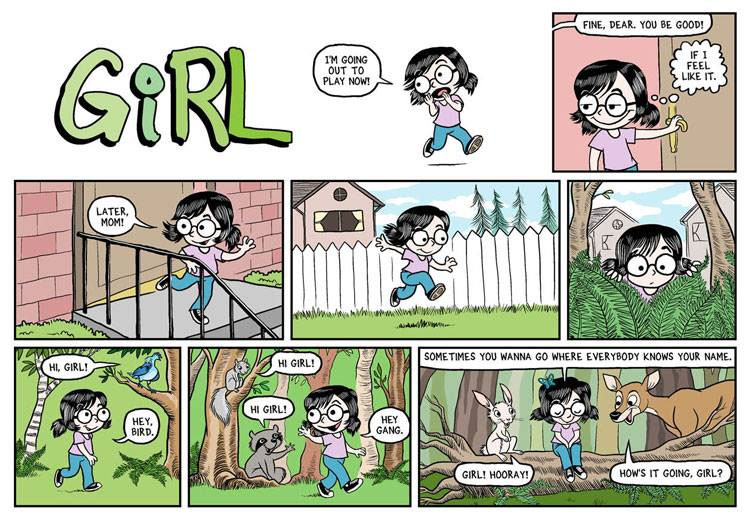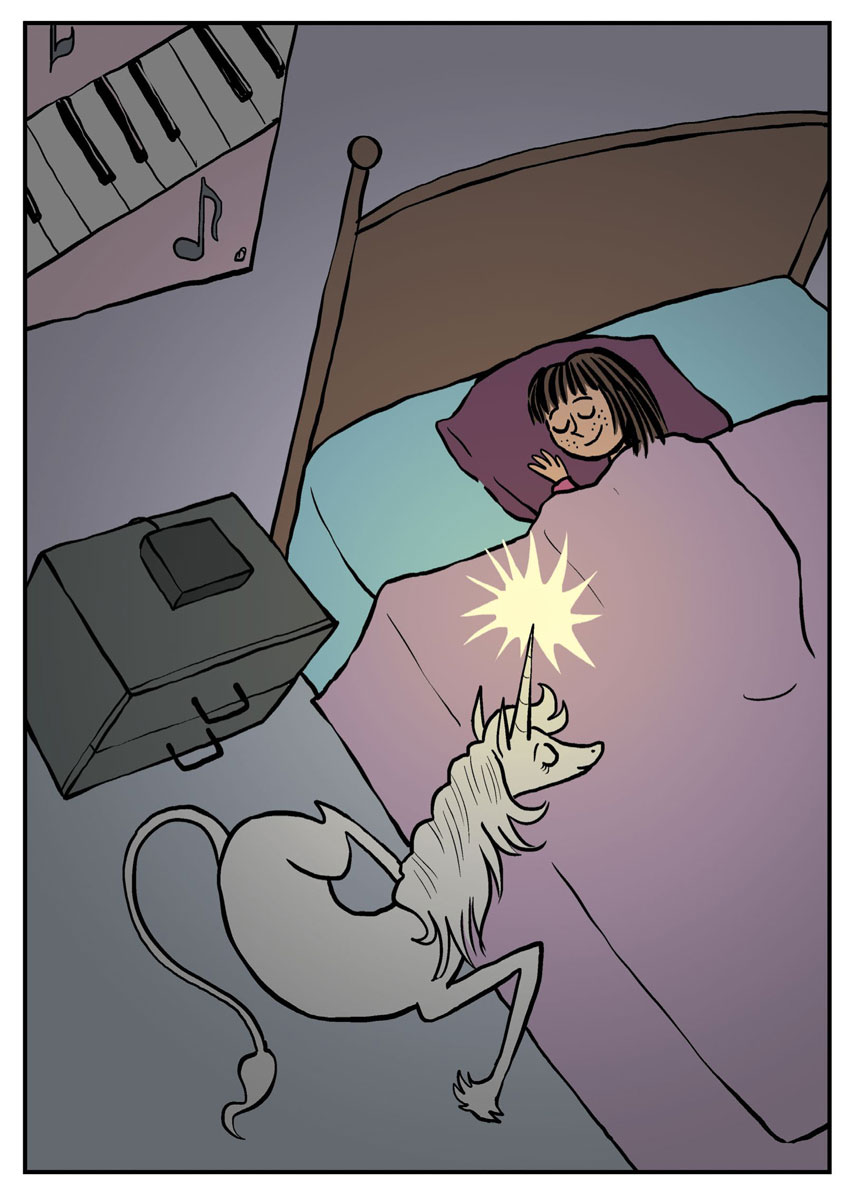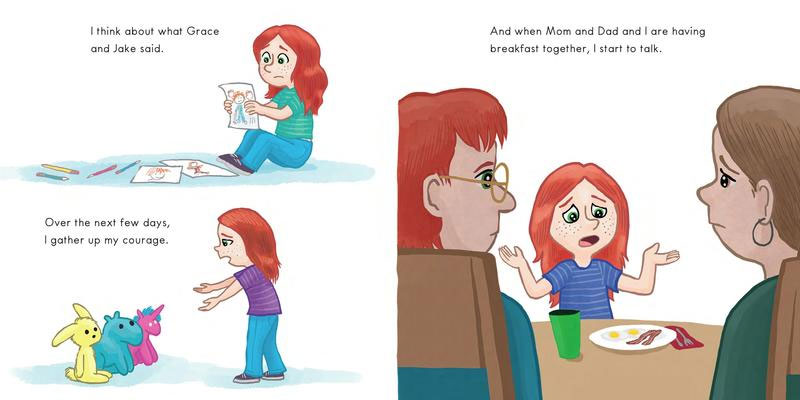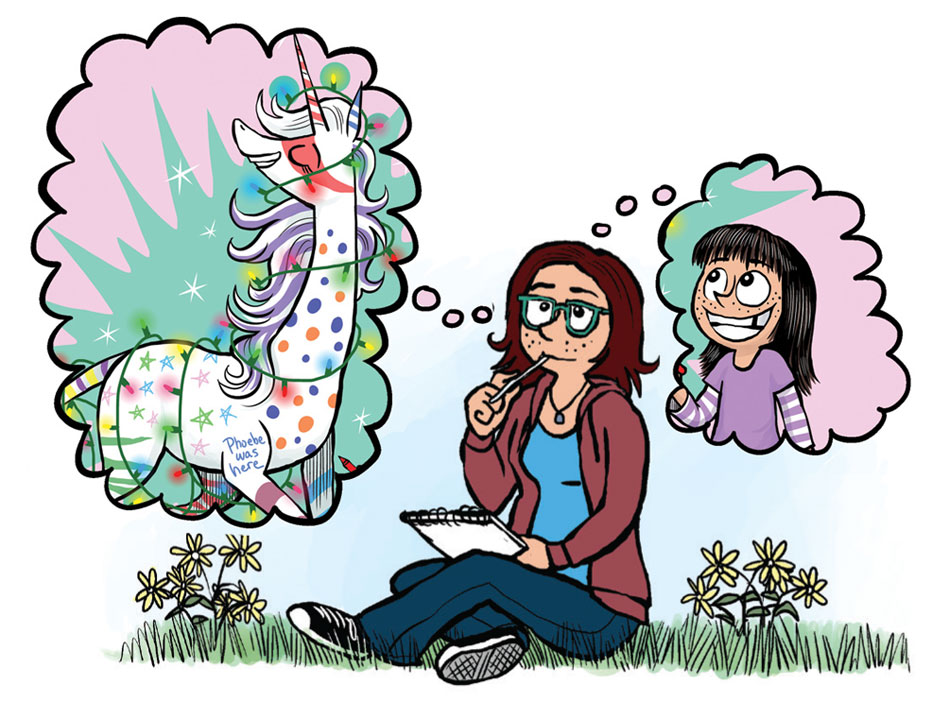'Phoebe and her Unicorn' (19 March 2015).
Dana Simpson, earlier in life known as D.C. Simpson, is a comic creator from the first generation of American webcomics, whose imaginative creations have also gained more mainstream success. Her breakthrough comic was the funny animal strip 'Ozy and Millie' (1998-2008). Its satire of teenage life and eccentric characters helped it grow a cult following. Simpson showed a more political side of herself with 'I Drew This' (2004-2009), a commentary on U.S. politics under the George W. Bush administration. Her best-known and most popular series is 'Phoebe and Her Unicorn' (2012- ), a children's gag comic about the friendship between a young girl and her magic unicorn. Running as a webcomic and since 2015 also as a traditional newspaper comic, their funny and sometimes strange endeavors have been translated into several languages.
Early life and career
Dana Claire Simpson was born in 1977 in Pullman, Washington, but lived predominantly around Seattle, Washington. She was born as David Craig Simpson, but always felt more like a girl. During her youth, most people in her immediate environment were unaware of transgenderism. Whenever she saw transsexuals in pop culture, they were either treated as a joke or something threatening. Simpson therefore felt very uncomfortable with herself and didn't talk to anybody about her feelings. In 2005, Dana Simpson came out as transgender. Her earliest comics appeared under either her old name Daniel Craig Simpson or D. C. Simpson, but nowadays she is known as Dana Simpson. Since her marriage on 7 August 2010 to David Brodbeck, she is called Dana Simpson Brodbeck.
Drawing from an early age, Simpson made her first comic strip at age five. As a child, she often asked her parents to explain several political references in Berkeley Breathed's 'Bloom County' strip. She also enjoyed reading Walt Kelly's classic 'Pogo' comics by borrowing book collections from the library. The concept of "broad and wacky" characters in complicated stories that discuss important ideas was her ideal as a perfect comic strip. Among her other notable influences are Lauren Faust, Lynn Johnston, Marjane Satrapi, Charles M. Schulz, Jeff Smith, Bill Watterson. While Simpson took some after-school art classes in elementary school, she is basically self-taught. She studied Journalism at the Evergreen State College in Olympia, Washington, followed by an education in Communication at Washington State University. After graduation in July 1999, she became a reporter and editorial cartoonist for The Puyallup Herald for six months. She left the paper in March 2000.
'Ozy and Millie' (14 January 1999).
Ozy and Millie
In January 1997, Simpson created her first comic strip 'Ozy and Millie', originally running in her college paper The Evergreen's Cooper Point Journal. In early 1998, a year after its debut, it also started as one of the early American webcomics. Between 2001 and 2003, the strip ran on the online portal Keenspot, but on 23 August 2003, Ozy and Millie's adventures were interrupted and fans had to wait five months for their return. From 22 January 2004 on, new episodes were posted, first independently, and then again on Keenspot from November 2006 until the comic's definitive end on 23 December 2008. Since then, reruns have appeared on Universal Uclick's GoComics.com website.
The series stars two anthropomorphic foxes, Ozy and his girlfriend Millie. Both go to North Harbordale Elementary School in Seattle. Ozy is a quiet, reserved character. He serves as the straight man to the far zanier cast members. He is raised by an adoptive father, a red dragon named Llewellyn. Llewellyn is an eccentric who once declared his own house an official country. Nevertheless, he still tries to run for President of the United States. Simpson was so fond of him that she gave him larger roles. Ozy's girlfriend Millie is excitable and stands up against any form of authority, either from her parents, teachers or friends. She is also a notorious prankster with Ozy as her favorite victim. Simpson based Millie on herself, though added that during the comic's original run she was far angrier at the world than she has been later in life. The character represented her own youthful aimlessness and frustrations. In contrast, Millie's mother, Mrs. Mudd, is a more reasonable character.
Sometimes described as a "furry webcomic" or a "funny animal comic", 'Ozy and Millie' is also a satire of education and teenage life, with occasional political commentary. In school, the title duo is confronted with a large group of colorful fellow pupils and teachers. The teen Avery, a raccoon, desperately tries to blend in with the "hip" crowd. Yet his little brother, Timulty, and his best friend, Stephan the Aardvark, unwillingly thwart his attempts. Timulty innocently informs everybody about his older brother's real persona, while Stephan's nerdy radiance also puts Avery in a bad light. An actual popular pupil is the snobbish sheep Felicia Laine, who scolds Millie for not following the norm and standing out from the crowd. In many episodes, they exchange verbal insults or have catfights. Ozy's nemesis is Jeremy the rabbit, a bully who often beats him up and throws him in trash cans. Another character in the 'Ozy and Millie' strip is Captain Locke, a fox who lives inside Llewellyn's couch and dresses like a pirate. The buccaneer is exasperated with his crew, whom he regards more as a bunch of children than vicious pirates.
Despite its sometimes irregular publication schedule, 'Ozy and Millie' quickly developed a cult following. The first five book collections of 'Ozy and Millie' were released by Plan Nine Publishing, after which Lulu.com collected all episodes in both a seven-volume series and a two-volume collection. On 28 August 2018, Andrews McMeel Publishing brought out 'The Best of Ozy and Millie', which marked the first time that the episodes were colorized.
'I Drew This' (8 April 2005).
I Drew This
On 30 January 2004, Simpson launched the political comic 'I Drew This' (2004-2009), originally published in The Daily Evergreen, the official college magazine of Washington State University. From November 2006 on, 'I Drew This' also ran as a webcomic on Keenspot, although it later also appeared in several print media, for instance Funny Times magazine. A gag-a-day series with both one-panel cartoons and comic strips, Simpson used herself as a character interacting with U.S. President George Bush Jr., U.S. Secretary of State Dick Cheney and other Republican politicians. On 22 September 2004, she introduced another recurring character, Joe the Liberal Eagle, an anthropomorphic American Eagle with left-wing progressive views. Since the tone of many episodes were very anti-Republican, Simpson used Joe as critical commentary on the U.S. Democratic Party. From 4 October 2005 on, the gags appeared in color. From April 2007 on, she started redrawing some of her better gags in the series and updated both her artwork, lay-out and commentary to present-day politics.
'I Drew This' (17 May 2007).
Created as a critical reaction against the administration of President George Bush, Jr., many episodes directly referenced news events from the mid to late 2000s. On 12 January 2009, after Bush left office and was succeeded by the Democratic President Barack Obama, Simpson announced that she would discontinue 'I Drew This'. In her opinion, things had improved in the past five years. Public opinion had turned against Bush's policies and the amount of left-wing alternative (online) media had risen. On her blog she summarized her reasons for quitting as: "I don't feel as needed, or as angry, as I did five years ago." She also added that she didn't want it "to be my job to think about politics. I don't want to be professionally obligated to think about stuff that makes me angry." Episodes of 'I Drew This' have been collected in the books 'Insert Title Here' and 'I Drew This', available on the online platform Lulu.
'Raine Dog', reflecting on Laika, the first dog in outer space.
Raine Dog
Shortly after discontinuing 'I Drew This', on 16 January 2009, Simpson launched a new webcomic, the short-lived 'Raine Dog'. It ran on the online platform Keenspot for about a year. The title character Raine was an anthropomorphic dog, who describes her experiences as being a pet and fighting against mankind enslaving dogs and giving them second rate citizenship. Parts of the narrative were told in flashbacks, while others featured random political commentary from a left-wing perspective. Simpson later admitted that she improvised the story as she went along, which explains the comic's rather directionless, stop-and-start feel. Simpson made an attempt at social commentary with dogs being a metaphor for oppressed minorities. Raine often wonders what value her life has in human society. People claim dogs have "no soul" and treat her with less rights than humans. As a result, she later joins a rebellion by a group of stray dogs against human society. However, several readers felt this philosophical-satirical undertone collapsed under its own lack of logic and gave strong criticism. Others were particularly shocked by a scene in which Raine the dog starts a secret relationship with Jeff, the young human boy who owns her, and is neutered afterwards as a "punishment". In general, Simpson herself didn't really know what direction she wanted to take the series to. Today, Simpson regards 'Raine Dog' as an old shame. Despite a one-episode attempt to relaunch the strip in April 2011, she never revisited the concept, nor had she collected it in book format.
'Girl', early version of 'Phoebe and her Unicorn' (2009).
Phoebe and Her Unicorn
In early 2009, Simpson had just terminated her webcomics 'Ozy and Millie' and 'I Drew This' and seriously considered quitting the industry. Only 'Ozy and Millie' had enjoyed a loyal fan base, but was nevertheless never picked up by a major print syndicate. It frustrated her that she still hadn't become a true newspaper comic artist and she considered becoming a children's book illustrator instead. Right at this pivotal moment, she learned that Amazon/Universal organized a talent search for potential newspaper comic artists. The winner of this "Comic Strip Superstar Contest" was to receive a publication and syndication contract. Simpson sent in a story titled 'Girl', which revolved around a young girl who talks to forest animals and escapes into a dream world. Simpson had observed that most newspaper comics lacked interesting girl characters. Usually they only received small roles or were rather one-dimensional compared with the male cast members. A prime example was Suzie in Bill Watterson's 'Calvin & Hobbes'. Simpson deplored that everything was always shown from Calvin's perspective, while Suzie had potential as a personality of her own. When she read in the 'Calvin and Hobbes 10th Anniversary Book' that Watterson himself said that "after so many strips about boys, a strip about a little girl drawn by a woman would be nice to see", she knew what path to take.
After sending in 'Girl', Simpson forgot about it for a few months, until her partner informed her that it had become one of the 250 entries nominated for the prize. Among the jury members were famous cartoonists like Garry Trudeau, Lynn Johnston and Mark Tatulli. As the jury members shifted through the material, Simpson's entry eventually made the Top 10. In the final decisive round, audiences could vote for their favorite. Simpson asked all the devoted followers of 'Ozy and Millie' to join in. In November 2009, to her pleasant surprise, she actually won. It made her more proud of her previous comics, which no longer felt as "wasted time". Because, without the success of 'Ozy and Millie', she would never have had the fan base to help her win the contest.
'Phoebe and her Unicorn' (2012).
Still, it took another three years before her 'Girl' comic was actually given an official print debut. During the wait, Simpson remodeled her concept into something different. The title character, Phoebe Howell, remained a nine-year old girl, but now meets a unicorn who is cursed to stare at its reflection in a pond. Phoebe breaks the curse by skipping a rock in the water, after which the unicorn introduces herself as Marigold Heavenly Nostrils (a name Simpson came across online when she typed in "unicorn name"). Grateful that Phoebe has liberated her, Marigold grants the girl one wish. Phoebe wishes the unicorn to become her best friend and so the two become inseparable. Right from the start, it is implied that the unicorn isn't just a figment of the girl's imagination. Other characters can see her too, a direct result of its "shield of boringness" that takes away people's potential amazement of seeing a fantasy creature being alive, making her just an ordinary appearance to them. Magic powers like these have allowed for a lot of imaginative gags. Phoebe and Marigold have a strong bond, though the unicorn loves teasing the little girl and can act rather arrogant. But in the end, their friendship survives any friction.
On 22 April 2012, the first episode of 'Heavenly Nostrils' was launched on the GoComics website. Three years later, the feature had gained enough popularity to be picked up by Andrews McMeel Publishing and be syndicated as a newspaper comic too. At the occasion, her editors advised her to pick a more straightforward title that would appeal more to conservative newspaper executives, the strip was retitled to 'Phoebe and Her Unicorn'. Elements of the comic were inspired by Simpson's personal life. Phoebe's parents, for instance, were modelled after her own. Her best friend Max is passionate about science, electronics and video games, just like the cartoonist's romantic partner. Phoebe has a love-hate friendship with Dakota, a girl in her class. Sometimes they get along fine, but other times they consider each other rivals. Dakota particularly can't take the fact that a "lame girl" like Phoebe has a unicorn for a friend. Interviewed by Billy Wolfe of The Charleston Daily Mail (25 March 2015), Simpson described Dakota as "a composite of the girls who gave me trouble in middle school. But she quickly became my younger sister Nicole's favorite character, so she's taken on some of Nicole's personality."
'Phoebe and her Unicorn' (9 August 2020).
Although Phoebe's name was derived from Holden Caulfield's sister in J.D. Salinger's novel 'The Catcher in The Rye', her personality is autobiographical. Interviewed by Brigid Alverson on GoodComicsforKids.Slj.com (20 June 2017), Simpson explained: "A lot of the strip is my inner child having a conversation with my unfiltered inner unicorn (...) Marigold is the voice in my brain that tells me how awesome I am, without the other voices that immediately go: 'Yeah, but here's all your flaws'." Simpson modelled Phoebe's looks after how she might have looked if she had been a girl from birth. In the same interview, Simpson explained that much of the comic started out therapeutic. At the time she was still undergoing her gender transition, and the comic was a compensation for the girl childhood she always wished she had. But 'Phoebe in the Unicorn' also expresses the satisfaction she now feels as a fully transitioned transgender. Phoebe knows far better how to cope with the world than Millie, Simpson's previous alter ego from her webcomic 'Ozy and Millie'. The serene, accepting male character Ozy and the angry, anarchic female character Millie were basically metaphors for her own conflicting thoughts. But with the two female leads in 'Phoebe and Her Unicorn', these feelings are now in balance.
Still, transgenderism isn't really a topic in 'Phoebe and Her Unicorn'. Max's parents are a same-sex couple and in early 2019, Simpson introduced Infernus the Unicorn of Death, a non-binary character. One newspaper in Utah didn't run that particular episode that day. Otherwise, Simpson said that there wasn't any major controversy about these characters, presumably since Lynn Johnston's 'For Better or For Worse' had already introduced same-sex parents and Garry Trudeau's 'Doonesbury' did the same with a non-binary character. In general, 'Phoebe and Her Unicorn' is a very traditional children's fantasy comic. Simpson explained that she was never an out transgender kid, making her childhood experience different from somebody who is young now. Including this theme in the comic would require significant research. Also, as she commented in the previously mentioned 2017 interview by Brigid Alverson: "the whole point of transitioning was so I wouldn't have to think about it constantly. I like that the issue doesn't come up in most interviews until or unless I decide to bring it up myself."
'Phoebe and Her Unicorn in the Magic Storm' (2017)
Phoebe and Her Unicorn: success
Even though 'Phoebe and Her Unicorn' is marketed to children, Simpson has stated that she didn't really think of them as her target audience. It could explain why the comic is equally beloved by adults and children. Since 30 March 2015, 'Phoebe and Her Unicorn' has been syndicated to more than 100 newspapers. Book collections have been published by Andrews McMeel Publishing. The first one appeared in the fall of 2014, and had a foreword by Peter S. Beagle, author of the fantasy novel 'The Last Unicorn', which Simpson has cited as a strong influence. The second 'Phoebe and Her Unicorn' book had a preface by Lauren Faust, best known as the creator of 'My Little Pony: Friendship is Magic'. While most episodes of the comic are self-contained gags, Simpson also released longer adventure stories through the graphic novels 'Phoebe and Her Unicorn in the Magic Storm' (2017) and 'Phoebe and Her Unicorn in Unicorn Theater' (2018). Other releases are the activity book 'Rainy Day Unicorn Fun' (2017) and the online 'Phoebe and Her Unicorn' Cartooning Guide', which children can use to learn how to draw cartoons.
'Phoebe and Her Unicorn' has been translated into French ('Lucie et sa Licorne'), German ('Fibi und ihr Einhorn'), Dutch ('Evi en Eenhoorn'), Italian ('Bia e o Unicórnio'), Spanish ('Cloe y su Unicórnio'), Portuguese ('Lucia e seu Unicórnio'), Polish ('Fibi I Jednorożec') and Russian ('Фиби и единорог'). On 19 March 2020, Simpson launched her own YouTube channel, where she reads episodes of 'Phoebe and Her Unicorn'. In June of that same year, it was announced that TV channel Nickelodeon considered adapting her comic into an animated TV series. Simpson revealed that some of the executives were worried that the series "might not appeal to young boys". To reduce the "girliness", she gave side character Max an equally big part, but otherwise refused to make more concessions in her screenplay. Nevertheless, on 28 December 2022 Simpson announced that the project had been canceled.
Musical career
Based in Goleta in Santa Barbara County, California, D.C. Simpson has also been active as a singer-songwriter, guitarist and saxophonist. Her musical influences are R.E.M. and Elliott Smith. Together with her sister, the electronic musician Nicole Johnson, she forms the band Ruiness. Between 2013 and 2021, they have released 6 albums and one EP. With her solo project Rain Ruin, she plays in an alternative folk style, and released the album 'Shiver' (Cafepress, 2005). One song from this record, 'Still Nina', is based on the character Nina Tucker from Hiromu Arakawa's manga series 'Fullmetal Alchemist'. YouTube users have frequently used 'Still Nina' as a soundtrack to compilation videos from the 'Fullmetal Alchemist' anime series.
Books on transgenderism
Simpson livened up the pages of Maddox Lyon and Jessica Verdi's book 'I'm Not a Girl: A Transgender Story' (Roaring Book Press, 2020). The book is an account by a real-life 12-year old transgender boy, Maddox Lyons, written by children's and young adult author Jessica Verdi. Simpson has also announced that she has been working on an illustrated book about her gender transition, 'Only You're Different', which hasn't been released yet.
Recognition
In 1999, 'Ozy and Millie' won the College Media Advisers Award for "Best Strip Cartoon", and the comic later also received the Web Cartoonist's Choice Award for "Best Anthropomorphic Comic" (2002) and three Ursa Major Awards for "Best Anthropomorphic Comic Strip" (2002, 2006, 2007). Three books in the 'Phoebe and the Unicorn' series have won prizes: 'Phoebe and Her Unicorn: A Heavenly Nostrils Chronicle' won the 2015 Scandiuzzi Children's Book Award, 'Phoebe and Her Unicorn' the 2015 Washington State Book Award and 'Unicorn on a Roll' the 2016 Pacific Northwest Booksellers Association Award.
Self-portrait from the 'Phoebe and Her Unicorn Cartooning Guide'.




